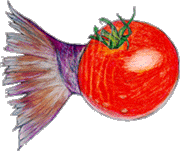 Tomatoes can resist cold because they contain fish genes |
Introduction |
 Fish in the Gulf of Mexico are killed by excess fertilizers |
 Tomatoes can resist cold because they contain fish genes |
Introduction |
 Fish in the Gulf of Mexico are killed by excess fertilizers |
| To the previous article |
Natural ecosystems maintain processes that limit the growth and reproductive success of species present. These communities of species have specialized traits so as to limit resource competition with other individuals, and consequentially to maximize their own growth and reproductive success. Recently in the Green Revolution, farmers, scientists, and agricultural businesses have played a direct role in tinkering with this system.
Intensive agricultural production singles out useful species, such as corn, wheat, cattle, hogs, etc., and maintains a monoculture ecosystem that maximizes production of the species on a minimal amount of land. Since the system is unstable, it is unable to maintain itself. Therefore, nutrients, water, fences, tillage, pesticides, herbicides, etc. are implemented to maintain the monoculture. Large, corporate farms, known as agribusinesses, combine large land resources with large amounts of political and economic influence to maximize their financial ability to utilize large amounts of the above listed implementations. As agribusinesses grow and the drive to maximize profit continues, more and more innovations for maximization of production in these monoculture ecosystems have begun to occur.
Intensive agricultural practices can lead to so much increased production on a limited amount of land. Thus, the efficiency and success of these practices has decreased dramatically in the past fifteen years, while the ecological, social, political, and economic costs have increased. However, agribusinesses still gain a monetary profit from such practices, regardless of the costs to society and the environment.
Biotechnology, which is any method that uses living organisms or processes to make or alter products, is increasingly important to modern agricultural production. An example of biotechnology that is assessed in this website is genetically modified organisms (GMO) that are genetically altered for traits that maximize production. Fertilizer and tillage use and over-use are significant methods in maximizing production. Fertilizer runoff and erosion, due to intensive farming practices, have indirectly reduced oxygen levels in the Gulf of Mexico, causing a large area of hypoxic water known as the dead zone. Biotechnology and use of fertilizers are just two of the many agricultural practices used to intensify production from limited amounts of land. The purpose of this website is to study each practice from an ecological, political, social, and economic viewpoint, and to organize recommendations for possible solutions to the high costs that have been increasingly seen from intensive usage of these practices.
 Read more about agricultural biotechnology |
 Read more about the impacts of intensive fertilization |
 |